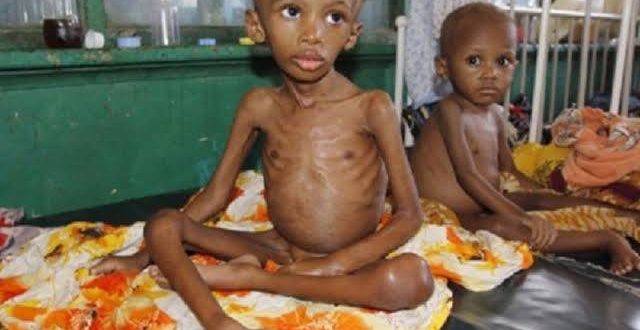In Nigeria, children often face abuse and exploitation in childhood due to lack of access to good nutrition and health. Kabiru, a child born with hope, faced insecurity and poverty from birth. Despite being expected to be healthy and strong, Kabiru’s growing body and brain required all the necessary nutrients, highlighting the need for better nutrition and health access in children like Kabiru.

Pregnant women prioritize their unborn children by providing essential minerals like iron and calcium. However, when they eat little or nothing, they have less to pass on to their babies. In Nigeria, 7.8 million pregnant women suffer from anemia, while three million malnourished children are among the country’s top three. UNICEF calls malnutrition an unacceptable global issue, and no country can afford to overlook it.
The World Health Organization (WHO, says malnutrition increases health care costs, reduces productivity, and slows economic growth, which can perpetuate a cycle of poverty and ill-health. Malnutrition in Nigeria is a major issue, affecting 35 million children under five, with 12 million stunted, 3 million wasted, and 23.5 million anemic. The 2023 Cadre Report revealed 17.7 million hungry people, with 1 million suffering from acute food insecurity. The average reduction in stunting is only 1.4% per year. However, with just N11, 000 ($14,00), Nigeria’s future could be saved through high-impact preventive interventions.
Former President of Ghana, John A. Kufour, said, “The socio-economic gains of investing in nutrition are significant and lasting. Shouldn’t we do what we can to prepare a healthier future for our children?”
UNICEF’s Nutrition Officer, Nkeiru Enwelum, emphasized the urgent need for investments and funding in nutrition to reduce malnutrition and improve diet quality. Enwelum said failure to prevent malnutrition in children, including stunting, wasting, and underweight, leads to long-term, irreversible impacts on cognitive and physical growth. Nigeria’s 2023 GDP is N506.6 billion, and failing to prevent malnutrition results in a loss of N76 billion, or 15 percent of the GDP.
Enwelum estimates that a child’s nutritional needs are currently estimated to cost N11,000, which is about five dollars per child per year. Treatment costs are nearly 10 times the current cost, with vitamin A supplementation costing 0.44 dollars. She said with N11,000, Nigerian children will have access to supplements such as zinc, vitamin A, and ORS for diarrhea, with the updated ORS supplement providing electrolytes.
Supplements like multi-micronutrient powder, deworming, folic supplementation, iron fortification, and salt iodization are essential for children to prevent malnutrition.
“The total to deliver all these preventive interventions per child per year is N11, 000. This time last year, when we did the analysis, 14 dollars were N6, 000 at the CBN rate. Now that same 14 dollars is about N11, 000, but the price in dollars is constant.”
Noting that the figures were from global estimates converted to naira, she said it was better to prevent than to treat, as it costs 131 dollars (N100, 000) to treat acute malnutrition and severe acute malnutrition.
“If you are making an investment case, it is better to prevent than to treat. These are interventions that are delivered through the health system, and they are run through the agricultural sector, which is iron fortification and salt iodization.
“Imagine that if you don’t prevent malnutrition in one child and you spend N100, 000, that money can save the lives of 10 children from malnutrition. In a way, the cost of treatment is actually depriving 10 other children of the prevention they could have gotten in the first place. We need to prevent malnutrition. When malnutrition occurs, you need to treat it to save the child’s life, essentially.
“If there is no treatment and prevention, it can lead to cognitive and growth impacts.” It can lead to a loss of income for households. If a baby is sick, the mother is not working. If you are working 9 to 5, you will take days off from work, and you will be thinking about your child and not concentrating. Sometimes you too will fall sick because of the stress, which will lead to reduced income.
“It costs N100, 000 ($130) to treat malnutrition through integrated management of acute malnutrition, which is 10 times the cost of prevention. That means that treatment is very expensive, and out of the three million children who are malnourished, not all of them are getting treatment. When that is not done, some of them will die, and when they survive, they end up stunted. We know that there is a relationship between stunting, mental growth, and cognitive impact, and that will affect the loss of income for the household, poor school performance, and increased morbidity.”
The UNICEF Nutrition Officer urged governments to increase funding for nutrition interventions and ensure timely release of funds. Speaking in Port Harcourt, Rivers state during a 2-day media dialogue on child malnutrition, she said: “Government expenditure on nutrition is inadequate. At the national and subnational levels, budgetary release is inadequate and does not match the budgetary allocation. We must ensure more money for nutrition and more nutrition for money.
“Despite the reiterated commitment to prioritize financial nutrition-specific and nutrition-sensitive interventions, this has yet to be achieved. We need to ensure that we integrate other sectors of the economy, like agriculture, the environment, and water resources, among others, into nutrition interventions. This will make sure that every sector is playing its part.
“There is also an urgent need to scale up nutrition interventions across the country, especially at the subnational levels, that is, at the states and their local government areas (LGAs).”
She discussed preventive interventions like community nutrition programmes, vitamin A and zinc supplements, micronutrient powders, deworming, iron-folic acid supplementation, iron fortification of staple foods, and salt iodization. She expressed regret over the government’s inadequate budgeting for nutrition.
“It is like your boss says he will pay you N150, 000 a month, but at the end of the month he gives you N20, 000, which is less than 30 percent of what you agreed on. That is consistently the case for nutrition.
“We are constantly getting less money than the government budgeted because a lot of programmes are constrained, we cannot effectively implement prevention interventions, and we are seeing an increase in the rate of malnutrition, so we have to spend more for treatment.”
She said though, departments have created for easy allocation of funds, yet money on the budget line is not allocated completely.
However, experts say that with the increasing level of multidimensional poverty in Nigeria, it is expected that malnutrition at all levels will worsen with the current food insecurity nationwide. While malnutrition in all forms imposes high costs directly and indirectly on the country, it overstretches the already bad economy coupled with the economic consequences at the individual, household, and community levels, hence the urgent need for the Nigerian government to consider massive investments in nutrition as it prepares its next budget in the coming months to allow the children to breathe.
(Vanguard)
 National Telescope national telescope newspaper
National Telescope national telescope newspaper



